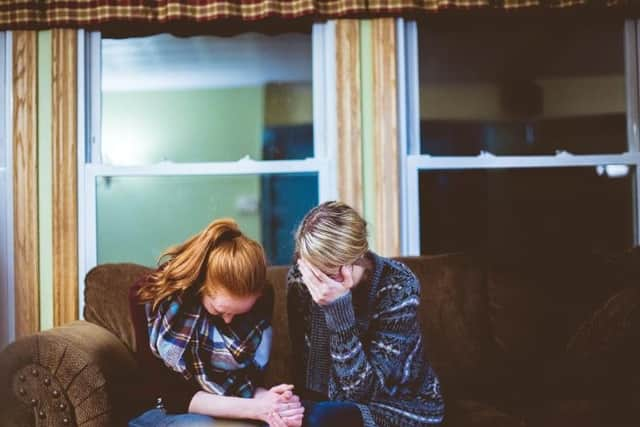Experts share tips on how to cope with grief over the Christmas period
and live on Freeview channel 276
We are surrounded by images of families together and there are memories everywhere reminding you of what you have lost.
And COVID-19 has made it all the more difficult.
Sussex based clinical hypnotherapist, Andrea Aro, said: “2020 will, undeniably, go down in history as an extraordinarily challenging year and I’m sure that most of us have had to face a steep learning curve when it has come to adapting to the ever changing ‘new normal’ and Christmas 2020 will be nothing like normal.


Advertisement
Hide AdAdvertisement
Hide Ad“The toll that COVID-19 has ravaged, leaves a wake of untimely loss which bears ever heavier on those left behind at Christmas, and the restrictions have meant that many have had to endure the additional anguish of being unable to say farewell to dying loved ones.”
Grief is a normal set of emotions that most people experience when coming to terms with the loss of someone they care about.
People experience it in different ways but may feel pain, shock, anger, guilt, depression and loneliness.
Asana Lodge is a private rehab centre, it highlights there is more than one type of grief.


Normal Grief – the loss of someone extremely close to you.
Advertisement
Hide AdAdvertisement
Hide AdAnticipatory grief – felt before the loss of someone you love. 40 per cent of women find pre-loss grief more stressful than post-loss grief.
Delayed grief – postponed reactions and emotions in response to loss of death.
Complicated grief – severe in longevity and significantly impairs the ability to function.


Disenfranchised grief –lack of social recognition or societal support of your loss.
Advertisement
Hide AdAdvertisement
Hide AdChronic – severe prolonged grief that can develop into severe clinical depression, self-harm or substance abuse
Distorted – manifests as anger, hostility, fighting or self harm.
Cumulative – built up over time due to many deaths, losses, life events.
Exaggerated – it intensifies normal grief responses and leads to self-destructive behaviour.
Traumatic – a product of an abrupt loss or tragedy.
Collective – felt by communities or societies.
Abbreviated – short-lived response to grief.
Advertisement
Hide AdAdvertisement
Hide AdAndrea said: “There are no rules or time scales to the process of mourning and it is a deeply personal healing journey. It is generally recognised that there are five key stops on the path of loss – denial, anger, bargaining, depression and acceptance – and some people will experience each one of them, whilst others will not. Some may travel back and forth between all or some of the stages, until they find their footing on a new path.”
“For some, it can feel right to hang on and focus on the end-of-life event itself, but the way someone died is not who they were and clinging onto that can hold you back from your own healing.
“I would encourage you to remember what happened before, all they did and achieved, and what they meant to you. What better way to honour those that have passed than talking and laughing about the good times you had together?”
Fiona Page is a bereavement counsellor at St Barnabas House in Worthing supporting families across Sussex. She offers some advice on ways you can make Christmas enjoyable.
Advertisement
Hide AdAdvertisement
Hide Ad“If you are able to, talk to your family or those who are close to you about how everyone is feeling and what they would like to do to celebrate Christmas this year. Remember everyone grieves differently and you may not all want to do the same things.
“Don’t put yourself under pressure to do everything that you usually do. Take a moment to think about what is really important this year and focus on that.
“Try not to feel that you are letting people down if you feel unable to join some activities. Most people understand that you might need to do things differently if your loved one died recently.
“Don’t worry about getting tearful or upset at times, its okay to be sad and it allows other people to express their feelings too.
Advertisement
Hide AdAdvertisement
Hide Ad“Take time to visit the grave of your loved one, their favourite beauty spot, or the place where their ashes are interred or scattered, if you feel that would be helpful.
“On Christmas Day, if you need to take a break, offer to wash up or get some fresh air by taking a brief wander round the block or the garden.
“If you are spending the day on your own or going back to an empty house at the end of Christmas Day, or you have no plans for Boxing Day, put a few things in place. Arrange to call a friend, select a TV programme or movie you want to watch and make sure you have some nice food in to eat.
“Add some light. You may not feel like a house full of decorations or putting a tree up but you could still put up some Christmas lights or light a candle or two.”
Advertisement
Hide AdAdvertisement
Hide AdThe St Barnabas House Bereavement Service offers free support to the family and friends of patients who have received care from the hospice, whether that has been in the community, in hospital, as a day patient or staying on the hospice ward. If you would like some support or have a question, call the Family Services team on 01903 706341, email [email protected] or visit www.stbh.org.uk/family-servicesAdvanced grief recovery specialist, health and life coach and best-selling author, Carol Wright explains how it is important to talk someone be a it a friend, healthcare professional, counsellor or family member.
She added: “Find a safe space - It may feel awkward at first, but the goal is to start feeling comfortable and safe talking about loss. Tears and sadness are a normal part of this process. Crying is a normal and natural reaction to loss of any kind. There is no time limit for this. You don’t need to be strong. You may just want to show your emotions’ and this is ok to do.
“For those that are supporting people, remember to listen to their experiences. Yours will be different and you will not be able to compare yours to theirs.”
Many agree that it is good to honour and remember those that have passed by raising a glass at the table.
Advertisement
Hide AdAdvertisement
Hide AdAndrea said: “The aim for most of us is to be able to remember the fun times with our loved ones with a smile and a laugh – and there will come a time that you can remember without feeling the physical ‘sting’ of the pain of loss. I believe, that it is important that we honour those that have passed and still find a way to move on with life, as hard as that may sound, and to attempt to live our lives to the fullest.”
Grief is an acknowledgement of how you feel about someone, there is no right or wrong way to grieve but what it important is to talk to people.
A message from the Editor, Gary Shipton:
In order for us to continue to provide high quality and trusted local news, I am asking you to please purchase a copy of our newspapers.
With the coronavirus lockdown having a major impact on many of our local valued advertisers - and consequently the advertising that we receive - we are more reliant than ever on you helping us to provide you with news and information by buying a copy of our newspapers.